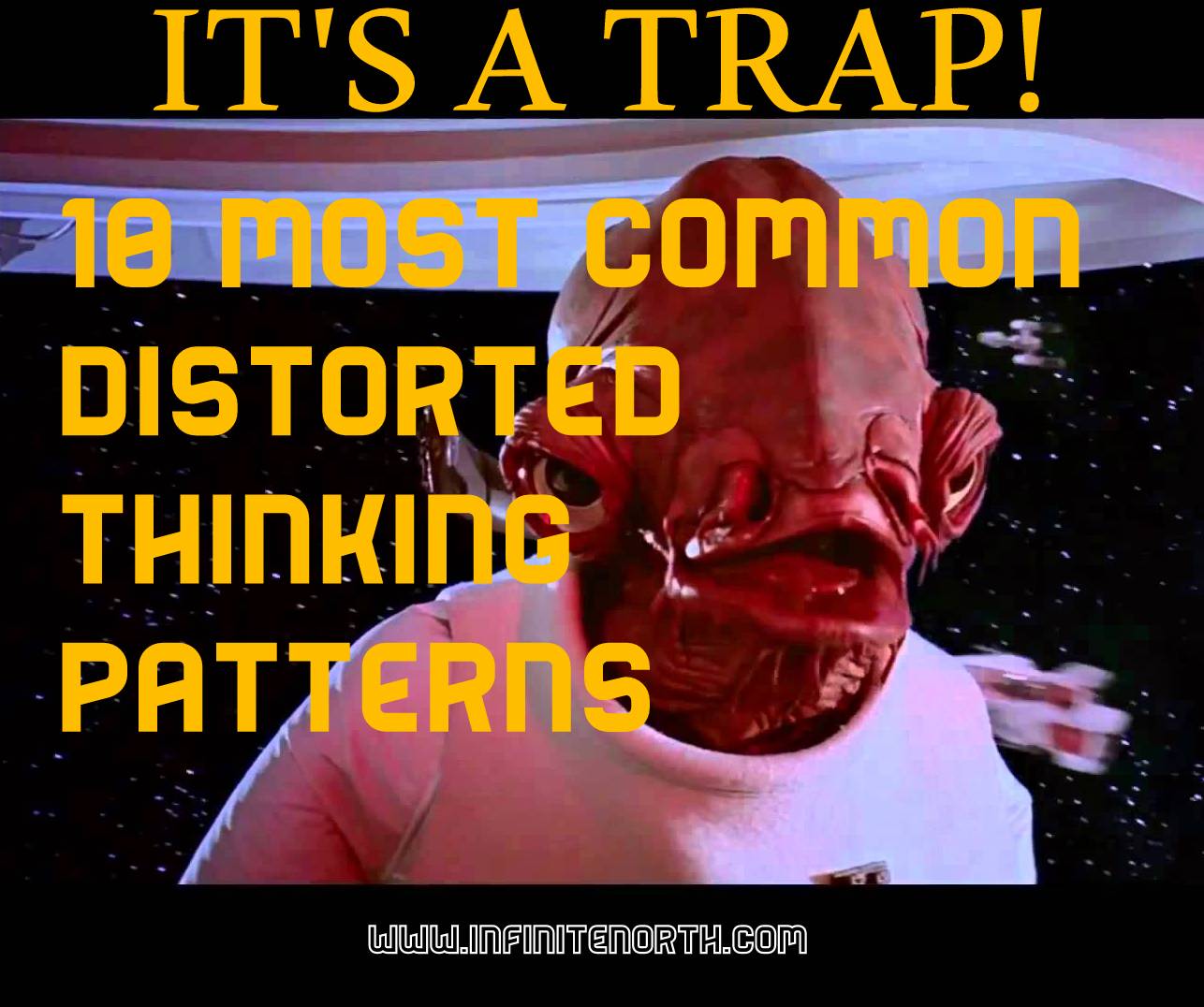We all get ourselves a little twisted sometimes. I start to think the world will collapse if I miss the trailers that run before the movie starts at the theater. I question my ability to function as an adult when I occasionally falter in completing my responsibilities (as a parent, business owner, therapist, etc.). Sometimes, I blame others, complain unnecessarily, and make utterly unhelpful assumptions about my circumstances and the people around me. In summary, I can simply say…I am human. My mind carries me to places that create and amplify distress without regard to reality. My thoughts become distorted and I suffer the consequences. The examples above are a few common iterations of distorted thinking. Over the next few weeks, I’ll breakdown some of the more destructive patterns and offer tips on how to manage these ten beasts:
- Catastrophizing
- The Mental Filter
- Black-and-White Thinking
- Mind-Reading
- Emotional Reasoning
- ‘Shoulding’
- Personalization
- False Permanance
- Blaming
- Magical Thinking
As you begin to challenge these distortions, take the time to write down the specific unhelpful thoughts you recognize and the alternative thinking patterns that will set you on the path to healthier ways of perceiving your experiences. You’ll see overlap in how these patterns feed into one another, each one making the others a little easier to believe, creating a seemingly unified (albeit distorted) vision of life. Don’t be fooled.
- Catastrophizing: With this distortion, all things become epic disasters (at least in your head). When we catastrophize, a poor grade on a test becomes a wasted semester. An unanswered phone-call becomes a break-up, a death, or some sort of missing person scenario. Stomach pain becomes an aggressive cancerous tumor, and being late for a meeting becomes certain termination and chronic unemployment.
Challenging Catastrophizing: This negative fortune-telling often stems from the question, “What if…?” One solution is to answer the “what if…” question in a way that is NOT distressing. The poor grade on the test merely means some additional studying on the next test. The unanswered phone call is because of a mid-afternoon nap or a phone that was incapacitated due to being dropped in the toilet. More important than making a more optimistic prediction is the recognition that the assumptions we make are nothing more than creative thinking, a short-story brainstorming session, a fiction writing workshop. There is no need to respond (emotionally or otherwise) as if those thoughts/prediction/assumptions are reality. If you “just know” something horrible is going to happy, you’re likely catastrophizing and would benefit from loosening your grip on the negative narrative.
- Mental Filter: An oil filter removes foreign objects to keep your engine running smoothly. A pool filter keeps the water free of debris, allowing you to enjoy a cool dip in pristine water. The distorted mental filter, however, leaves you with only the gunk, eliminating the helpful, supportive, validating thoughts necessary for us to flourish. There are two major types of filter and they are often applied together. Both are frequently self-directed, but they can be just as harmful in interpersonal relationships.
- Focusing on the negative: One version of this filter effortlessly and automatically hones in on all the worst aspects of any experience. Did you misspell one word in that 10-page assignment? The negative mental filter focuses in on that solitary mistake and shouts “FAILURE” rather that embracing the accomplishment of completing a lengthy assignment (even if there were a few mistakes). A great evening out with your spouse may go down the tubes because of a 5-minute conflict or one awkward moment. One small piece of constructive feedback from a boss after heaping praise on you? Focusing on the negative has you believing the boss is going to fire you (or at least hoping you quit).
- Dismissing the positive: This form of the mental filter often goes hand-in-hand with a negative focus…but it doesn’t even require you to make an actual mistake or have an uncomfortable experience. When you’re automatic response to a compliment is, “You’re just being nice” or “You don’t really mean that.” You’re viewing life through this filter. When you win the gold medal and follow it with a “Yeah, but….” you’re becoming more effective at diluting, dismissing, rejecting, and otherwise avoiding the joyful experiences in your life. Dismissing the positive means you don’t receive, in any genuine way, the validation, recognition, or appreciation being offered in your daily interactions.
Challenging the Mental Filter: When you find yourself focusing on the negative, strive for balance – the ability to identify and embrace the dichotomy inherent in everything. KEYWORD = AND. “I wrote a great paper AND there were a couple mistakes.” “My supervisor likes my customer service AND I’ve still got a few things to learn about the computer system.” To challenge the tendency to dismiss the positive, work on providing yourself a little more validation, recognition, and appreciation on your own terms. Find a reason to pat yourself on the back. If you’re not that impressed with winning the gold medal, congratulate yourself on the hard work and commitment the award symbolizes. Just find the reason. Some days that reason is small – getting out of bed, eating something besides Doritos for breakfast, or just brushing your teeth. Don’t let the relative simplicity of the task stop you from celebrating the accomplishment. When other people compliment you or want to recognize your greatness in some way, say “thank you,” and refrain from discrediting their high opinion of you*. Also see ‘Coach or Critic‘ for more thoughts on how be be a little less self-critical.
*This pertains to compliments and positive feedback delivered in a respectful way by well meaning individuals. “Compliments” in the form of cat-calls or unsolicited objectification can be summarily ignored, redirected, rejected or confronted as necessary.
Next time, we’ll breakdown how Black-and-White Thinking and Mind-reading can get us into trouble


